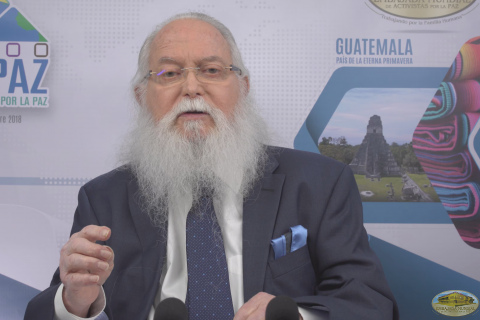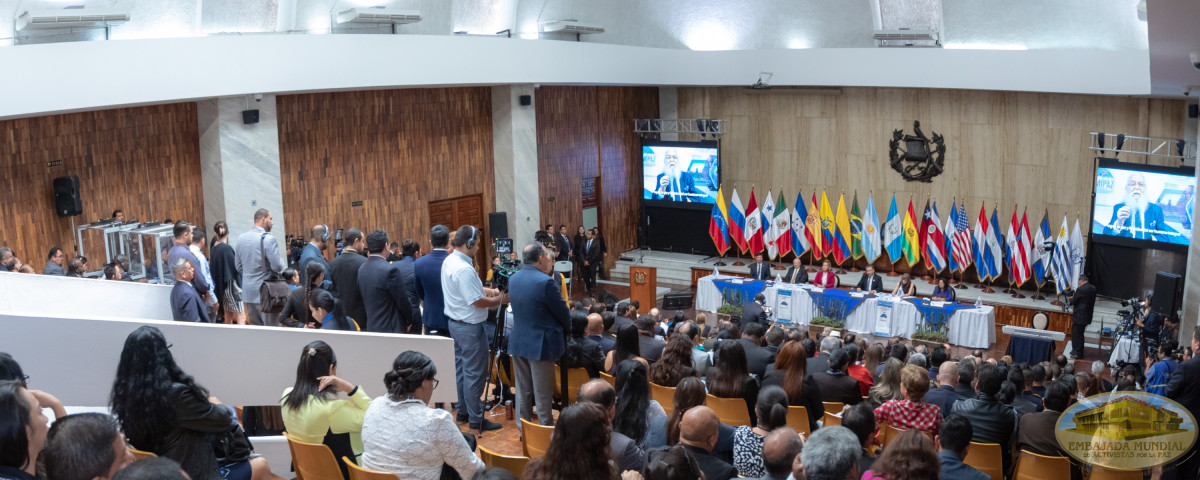William Soto exposes: The value of justice lies in the heart
Justice and Democracy Session promotes the union of efforts and the establishment of commitments for the strengthening of the judicial system
Before high courts judges, presidents and magistrates of judicial institutions of Latin America, Europe and Africa, William Soto Santiago, executive president of the Global Embassy of Activists for Peace (GEAP), presented the vision of the work of the institution for the consolidation of a universal system of justice for the peace of the human being, nations and Mother Earth.
 Soto addressed his words at the opening of the Justice and Democracy Session that takes place in the Judicial Palace of the Republic of Guatemala, a supreme event organized by GEAP within the framework of the 4th Peace Integration Summit, CUMIPAZ 2018.
Soto addressed his words at the opening of the Justice and Democracy Session that takes place in the Judicial Palace of the Republic of Guatemala, a supreme event organized by GEAP within the framework of the 4th Peace Integration Summit, CUMIPAZ 2018.
He explained that this session has as its main objective to generate a space that allows reflection on the importance of the value of justice, the preservation of its natural essence and its scope, considering that its natural effect and its work is to generate peace, harmony and permanent security for a prosperous world.
In addition, he indicated to the present authorities that it is an opportunity to strengthen ties, join efforts and look for channels that allow the reach a universal justice for peace and strengthen the judicial sector; he said:
"We consider the pressing need of move forward in our roles into the strengthening of a universal or global justice and international cooperation; reason why this space has sought annually that together, all of us can generate proposals aimed at achieving efficient, effective and timely justice throughout the planet, and more equitably. Also that we can generate processes of reflection, and thus set ourselves challenges, but also strategies, that guarantee access to justice as a fundamental principle of a State of law, eliminating the barriers of exclusion that have impeded its crystallization".
Impart justice from the heart
He stressed that the principles of justice that guide his administration have been unknown by the human being, generating weaknesses and serious effects on the system, which ensured that in the majority of opportunities it has generated a crisis or ignorance of judicial mechanisms as the model for resolve a situation in a legitimate and just manner.
This approach is derived from the educational theory for peace and happiness of the integral human being, of which William Soto is the author.
"This theory states that the value of justice rests in the heart, as well as free will, and invites the human being to perform imaginary exercises that allow him to project in a symbolic way the balance of justice, and thus separate the possibilities of their performance and identify the possible consequences of their behavior. Free will (in the face of the scale as a typology of justice) will generate balance; and through a weighting trial will decide whether or not to act fairly, "he said.
Soto said that the ability to decide in a fair way depends to a large extent on the values and principles that the human being has sown, which leads him to define the tilt side of the balance.
Justice as an attribute of common interest
The leader of the activists for peace emphasized that all people should be considered an active part of the process to achieve the consolidation of universal justice.
"Justice is not only of interest to judicial operators, scholars of law or social sciences; it belongs to all humanity, taking into account that each of the behaviors that we deploy can be made effective. In this sense we see justice as the attribute of common interest, which has the capacity to achieve the much desired peace and happiness in our environment, "he concluded.


